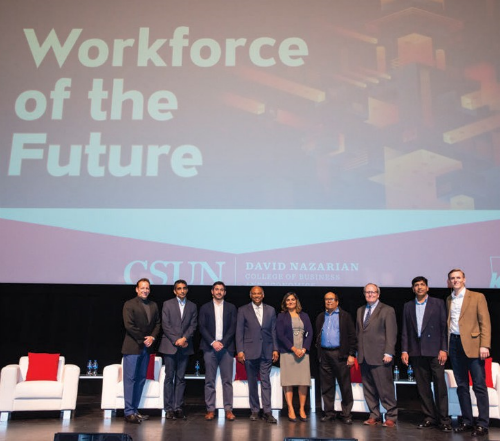A senior tech executive from a global firm recently challenged us: “What are you doing to teach students the technologies they will encounter in the real world?”
This led to a lively and provocative conversation that ultimately turned on a more fundamental question:
“Should college curricula emphasize skills that land students a first job, or attributes that provide the foundation for a long-term career?”
Gen Z students currently fill our classrooms. “Digital natives,” they’ve only lived in a world in which the answer to every question resides in their hands, a few clicks away. Spontaneous inquiry, immediate answers, crowd-sourced from global peers, largely accurate for the discerning, shared virally, with brevity. Lots of brevity. And plenty of video – to instruct, explain, demonstrate, entertain and communicate. 90-seconds or less. A decided preference for mobile hardware. Always on.
Contrast the implied attention span of such generational proclivities with the very name of an emerging and important branch of data science: “Deep Learning.” It begins to frame the challenges for accredited business colleges – and their weighty responsibilities.
Gartner estimates that a third of all current jobs in the US will be converted to software, robots and smart machines by 2025, and that when today’s grade school students enter the post-college workforce, 65% will take jobs that currently don’t exist.
Big data, artificial intelligence, blockchain, IoT, machine learning, smart contracts, process robotics – the disruption they will spawn has been compared to the steam engine and the Internet, but more rapid and pervasive in their impact, especially for what we call “work.”
Consider the Port of Los Angeles and the upstream and downstream companies it influences. Recent media focused on labor unease regarding infrastructure investments predicated upon autonomous vehicles, powered by 5G technology. That disruption was easy to visualize and render on the small screen.
Less so, but perhaps more profound – the news in June that TradeLens, a blockchain joint venture of MAERSK and IBM, closed deals with two more major shipping firms, extending the scope of their platform to more than half the world’s ocean container cargo.
Interspersing “smart contracts” within the TradeLens blockchain community will bring cheer to CFO’s throughout the value chains of importers and exporters in every industry. It will automate invoicing, shrink accounts receivables and payables to levels approaching zero, and drastically compress cash conversion cycles. This will be achieved securely, transparently, largely without the intervention of third-party professional service providers, and with substantial reductions in internal headcount.
To be clear – in this example and in thousands more like it, there will still be work. But what will it look like? What knowledge, skills and attributes will be required to do it? What must students and young professionals do to survive and thrive? What must we do to prepare them?
Over the past year, we’ve been approached by a half-dozen major tech firms and “last mile” skills training firms petitioning us to add their content to our curriculum, to enter alliances that trade and share resources and programming, and to provide a privileged conduit to our students and alumni. These firms face an undeniable labor shortage for programmers, business requirements analysts and developers – and it extends beyond the firms, to the third-party developers that comprise their platform ecosystems. The evisceration of the H1B Visa program hasn’t helped. But the skills gaps they face are vocational. This is an industrial and commercial problem, not an academic one.
It’s noteworthy that while corporate recruiters demand “employable skills,” their C-suite executives invariably answer quite differently when asked what employees will need to succeed in the future. To be sure, firms hire for skills – but they promote for higher order attributes: critical thinking, persuasion, flexibility and adaptability, scientific and technical conversance to set context and opportunity in the marketplace, execution, intellectual curiosity and courage. Such talents develop over time – inspired and founded on broad, balanced curriculum. Education that expands, not training that narrows.
Amazon has shown considerable leadership in addressing this paradox with their recent commitment of $700 million to retrain two-thirds of their workforce in data science, AI and machine learning. To prepare society for what’s coming, more such industrial efforts will be required. And they must endure, as even today’s transformational technologies will face disruption with 5G and quantum computing in the years ahead.
For good and appropriate reasons, course content and curriculum changes at accredited colleges of business don’t happen overnight. To maintain academic integrity, we must respect process so that our pedagogy is not subject to whim or fad. So how do we balance a deliberative and structured process in the face of immediate transformation of entire industries?
At the David Nazarian College of Business and Economics, we’ve taken a “data first” approach to curriculum innovation, with required coursework and graduate level degree innovations. This recognizes that as cognitive technologies evolve, data science will remain at the core.
We’ve complemented and augmented this with intensive and innovative co-curricular programming. In particular, our Workforce of the Future initiative brings together leading technology firms and their pioneering clients who have embedded cognitive technologies into their business models and go-to-market strategies. Last November, more than 700 people attended an on-campus event during which IBM and KPMG presented the ways in which their alliance on Watson AI is transforming the practice of accounting. A similar event is planned for this Fall to consider the current revolution in the telecommunications, media and entertainment industries.
Our goals – foment cultural change; encourage inquiry; inspire intellectual curiosity and courage for life-long learning; and, provide forums for provocative conversation regarding the technologies, skills, attributes and attitudes that will shape career readiness and success in the decades ahead.
We’ve embraced all of it, with enthusiasm and verve.
Robert J. Sheridan serves as Executive Director of the Center for Career Education and Professional Development at the Nazarian College at CSUN. The views expressed here are his own.

